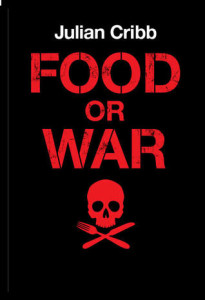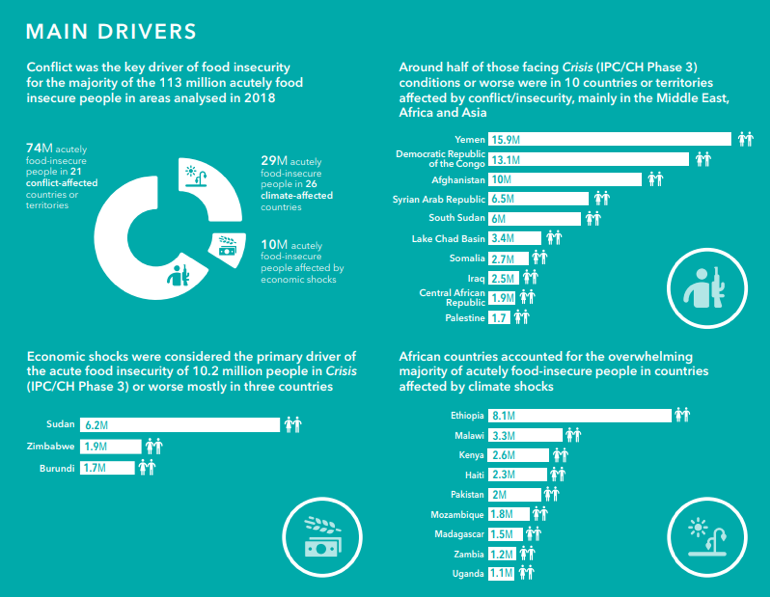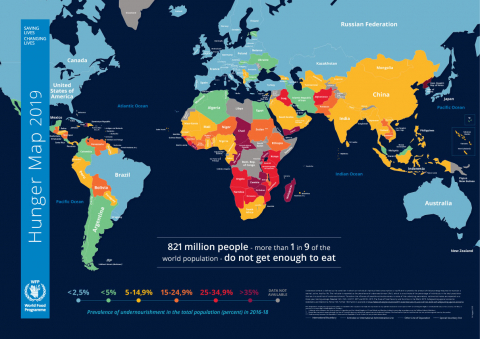Food Will Decide the Human Future
Dec 5th, 2019 | By admin | Category: Food and Hunger/AgricultureBy Julian Cribb FRSA FTSE*, guest writer.
The fate of human civilization in the mid-21st Century turns critically on food. Success in overcoming the intersecting challenges of climate and resource scarcity will bring peace, plenty and a chance to repair the Planet. Failure will bring war.
Food or War (Cambridge University Press 2019) presents compelling evidence that the world urgently needs to re-think the present global food system – or face the risk of spreading conflict and mass-migration crises triggered by rising disputes over food, land and water.
In short, it argues, we have a choice before us – between food or war.
Humans have been fighting over food and the resources to produce it for more than 17,000 years and famine is embedded in most of the major conflicts of recent history, as cause, effect or both. For example – though it is often forgotten – the war aims of the Axis Powers in World War II were to acquire farmland and resources in other countries to consolidate their own security.
Today up to a dozen conflicts are being fought out worldwide – mainly in Africa, but increasingly in the Middle East, Asia and Latin America – in which food, land and water insecurity has fuelled the confrontation. What more proof do we need?
Beyond this, the book lists seven ‘powderkeg regions’ of the Earth, regions harbouring the majority of the human population, in which water and soil resources are running out and food supplies are increasingly stressed in the face of insatiable population and economic demands.
Each year more than a third of a billion people now leave their homes, either as refugees or ‘economic migrants’, seeking a safer future elsewhere – a number which could rise to a billion or more by the mid-century if the sustainable production of healthy food continues to be neglected. Such numbers would overwhelm national borders and cause governments to fail.
Furthermore, potential nuclear confrontation over food, land and water – as between India and Pakistan, for example – would plunge harvests worldwide into a ‘nuclear winter’, causing a sudden, sharp drop in food availability even in distant countries which consider themselves immune to famine.
The same global food system that fed 2.5 billion humans in the mid-20th Century, one based largely on broadacre farming, pumped up with technology and fossil fuels, cannot meet the needs of 10 billion people living on a hot planet in the mid-21st. It is simply unsustainable.
Our present food system loses up to 70 billion tonnes of topsoil every year. It uses two thirds of the planet’s available freshwater – water that is rapidly being taken away from farmers to supply megacities or vast mining activities. It distributes 5 million tonnes of specialised poisons worldwide each year – poisons that affect the health both of humans and wildlife, such as honeybees. It generates around 30 per cent of humanity’s total greenhouse emissions. It is horribly vulnerable to climate change.
Every meal one eats devours ten kilos of topsoil, 800 litres of water, 1.3 litres of fuel, 0.3g of pesticide and emits 3.5 kilos of CO2. Like most people, you do that three times a day. In total humanity does it 20 billion times a year. We are consuming the Earth in order to feed ourselves – an act that is both unwise and bound to end badly.
These stark facts constitute an irrefutable argument to change our old food system in favour of a new one – one that can withstand the blows of a changing climate, with uses far fewer natural resources to produce and which constantly recycles those it does use. In Food or War I describe a food system for the future – and the profound benefits it can deliver not only to food security but also to world peace, human equity, preventing extinction and helping to slow climate change.
First, and most important, is that a new world food system must make nothing worse: it must not exacerbate any of the ten global catastrophic risks described in Surviving the 21stCentury (Springer 2017). It must ease climate change, reduce the threat of war, regenerate the natural world, nourish all of humanity, cleanse our polluted planet, improve our health and wellbeing and more beside. It is a tall order – but achievable.
It is possible, by working together globally, using the internet and social media to share the ideas and solutions already being developed and tested by innovative farmers, scientists and food producers round the world at lightspeed.
On present trends it is probable that the world population will peak in the late 2060s before commencing a slow, voluntary decline, over the next 60-100 years, to a sustainable level. It is this bulge in human numbers which the new food system must bridge – or we face an involuntary crash in our numbers, compounded by climate, famine and war.
Broadly, a future global food system capable of achieving a safe human future has three main pillars, each yielding about one third of the total food supply:
- Regenerative farming, replacing current systems, which repairs soil and water, provides clean healthy food, locks up carbon and which re-wilds almost a third of our present farmed area to end the 6th
- Climate-proof urban food production, based on intensive systems that recapture and recycle all urban water and nutrients, currently lost, back into sustainable, healthy food.
- Deep ocean aquaculture (avoiding the pollution and disease caused by intensive coastal systems) to replace the failing wild harvest of sea fish. Algae culture will provide the basic feedstock for both aquatic and land-based livestock, using recycled nutrients.
![Sustainable coffee cooperative worker, near Bwindi Impenetrable National Park, Uganda [photo: Suzanne York]](http://populationgrowth.org/wp-content/uploads/2019/12/woman-Bwindi-coffee-coop-picker2-1024x678.jpg)
Sustainable coffee cooperative worker, near Bwindi Impenetrable National Park, Uganda [photo: Suzanne York]
These systems and the people developing them are described in Food or War. It proposes the employment of former farmers and indigenous people globally as ‘Stewards of the Earth’ to replant trillions of trees and rewild abandoned farmlands, so locking up carbon to curb global heating and helping end the extinction of wild animals and plants worldwide.
To fund such a program, one solution would be a proposed levy of 20 per cent on world military budgets – currently $1.8 trillion a year – which would not only feed everyone and repair the planet, but also greatly reduce the threat of war. Food will become our greatest ‘weapon of peace’.
Though much of the world is complacent and supermarkets seem to bulge with food, it is often neither nutritious nor sustainable. Stocks could vanish in days, if just-in-time systems were to be disrupted – by war, energy crisis or climatic events. No single megacity on earth can feed itself. We are far closer to hunger than most of us suspect.
Just as a clean, green energy revolution is sweeping the Planet, we now need a clean, sustainable food revolution – possibly the greatest advance in human history. The ideas, technology and resources to achieve it already exist. All we must do is recognise the urgency – and set to work, together, to build it.
Julian Cribb, FRSA FTSE, is an Australian science writer and author of ‘Surviving the 21st Century’ (Springer 2017) and “Food or War’ (Cambridge University Press 2019).



